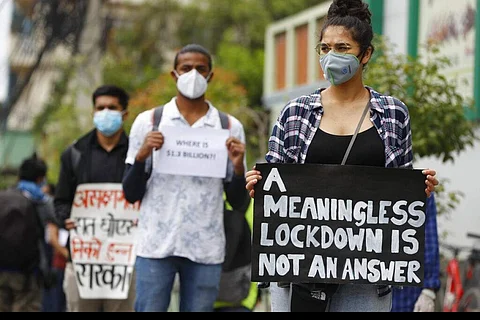

On a sunny June day in Nepal, hundreds of young people in face masks stood a meter apart behind the barbed-wire barricades and rows of riot police guarding the prime minister's residence, shouting slogans demanding a better government response to the coronavirus pandemic.
In a rare show of young people humbling a powerful government to action in Asia, they got one. But not before hundreds of protesters were doused with water cannons, some beaten with police batons and others detained. A charismatic young leader nearly died on a hunger strike.
"Governments have mishandled the coronavirus situation in many countries but it was unique for youths in Nepal to come together for non-political peaceful protests to point out the wrongdoings, make them admit it and then correct it," said Dinesh Prasain, a sociologist at the prestigious Tribhuvan University.
Prime Minister Khaga Prasad Oli's government imposed a nationwide lockdown in March, sending tens of thousands of migrants workers, hungry and cashless, from the capital, Kathmandu, to their rural mountain villages, mirroring a similar exodus in neighbouring India.
At the same time, thousands of Nepalese streamed back across the Indian border, but there were no quarantine centres or government assistance to help them reach home. As Nepal's caseload grew daily, Oli was publicly embroiled in a power struggle within the ruling party and a feud with India over disputed borderlands.
Top officials were accused of corruption in local media over the government's purchases of medical equipment and supplies from abroad. Authorities failed to expand the country's hospital bed count and quarantine and isolation facilities. They also began relying on cheaper, and less accurate, tests to determine the disease's spread across the Himalayan nation.
"For months we stayed home and gave our support to the government obeying the orders, but during the lockdown we realized the incompetence of the government to handle the coronavirus situation," said Robic Upadhayay, a 29-year-old filmmaker.
Upadhayay joined friends locked at home in a social media campaign that quickly organized street protests under the banner "Enough is Enough" attracting hundreds of thousands of online followers a significant feat in a country of 30 million.
A social media post from Iih, a 29-year-old high school dropout who previously had campaigned for the rights of ethnic minorities, gathered 400 demonstrators at the first protest. He was detained by police. "After weeks of lockdown, we thought that just protest in virtual space was not enough. It was an issue of life and death, so I asked on Instagram if anyone was ready to come out. There were 400 people who responded," Iih, who goes by one name, said.
But the response from the government did not come easy at first. Iih went on hunger strike, initially for 12 day in June and then again for 23 days in July, when he had to be taken to a hospital because his health deteriorated.
